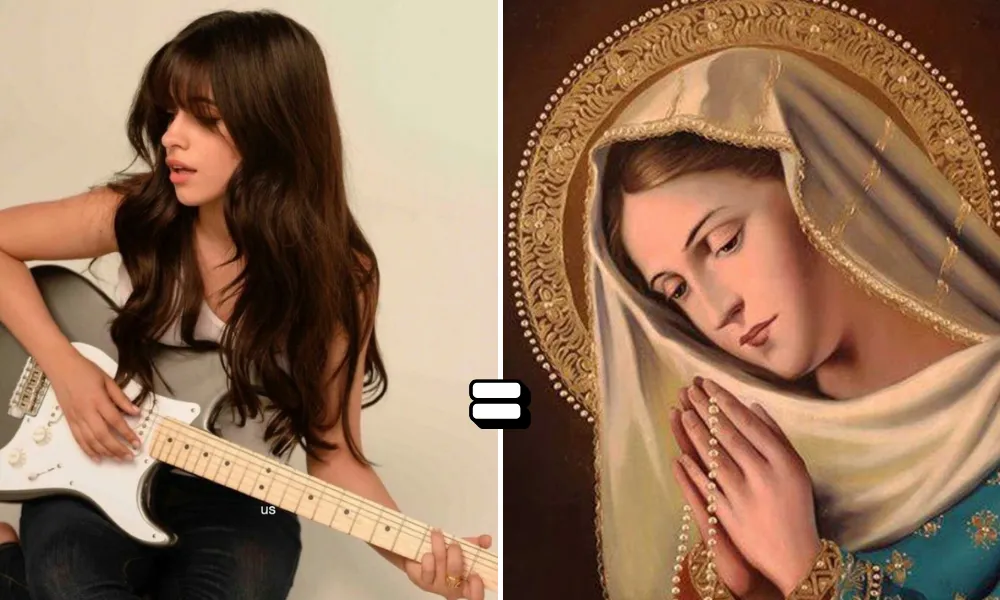

Camila Cabello Dubbed “Virgin Maria” for Supporting Fifth Harmony’s Reunion Without Her
The world of pop music is rarely free of drama, and few groups have embodied that truth more than Fifth Harmony. Since their formation on The X Factor in 2012, the group has been both celebrated for their vocal power and scrutinized for the tensions that followed them. When Camila Cabello departed in 2016 to pursue a solo career, fans wondered whether the wounds would ever truly heal. Fast forward to today, with rumors and confirmations of a Fifth Harmony reunion circulating widely, the spotlight has turned to Camila again. This time, she is being called the “Virgin Maria” by fans and critics alike, for publicly showing support for the group’s reunion—even though she herself is not part of it.
The nickname, equal parts sarcastic and reverential, reflects the complicated dynamics between Camila, her former bandmates, and the fans who still debate what her exit meant for the group. What does it mean when a star once accused of abandoning her group embraces their return? Is it a gesture of maturity, a savvy PR move, or a way to reclaim goodwill from fans who felt betrayed years ago?
The History of Camila and Fifth Harmony
To understand the significance of this moment, one has to revisit the history of Fifth Harmony and Camila’s departure. The group, composed of Ally Brooke, Normani, Dinah Jane, Lauren Jauregui, and Camila Cabello, quickly rose to fame after The X Factor. They delivered chart-topping hits such as Worth It and Work From Home, gaining a massive international fanbase known as Harmonizers.
But behind the success, cracks were forming. Camila, often spotlighted for her unique vocal tone, began collaborating on projects outside the group. When she officially left in 2016, the split was anything but smooth. Statements from both sides hinted at miscommunication, hurt feelings, and disagreements over artistic direction. The other members carried on as a four-piece, while Camila launched a solo career that quickly soared with hits like Havana and Señorita.

The Reunion Without Camila
Now, nearly a decade later, Fifth Harmony has found itself back in headlines thanks to news of a reunion. For longtime fans, it’s a moment of nostalgia and redemption. Yet the detail that Camila is not part of this reunion has reignited old debates. Some see it as a natural choice, given that she has firmly established herself as a solo act. Others interpret her absence as lingering proof that the rift never truly healed.
What surprised many, however, was Camila’s public show of support for the reunion. In interviews and on social media, she expressed nothing but positivity, cheering on her former bandmates as they return to the stage. For this, fans gave her the ironic yet affectionate title of “Virgin Maria”—a reference to her saint-like willingness to bless the group despite being excluded.
Fans’ Mixed Reactions
The fan response has been predictably divided.
Supporters of Camila see her actions as a sign of growth and maturity. They argue that it takes courage to support a group you once left, especially knowing that fans might still harbor resentment. For these fans, Camila’s blessing shows that she values harmony—both literal and metaphorical—over old grudges.
Critics, however, are less forgiving. Some accuse her of trying to insert herself into a moment that does not belong to her. They argue that by publicly commenting, she draws attention away from the group and back onto herself. Others see the “Virgin Maria” title as mocking, a way to suggest that Camila’s support is less genuine saintliness and more strategic positioning.
Why the Nickname Stuck
The reason the “Virgin Maria” nickname resonated so strongly is that it captures the contradictions of the moment. On one hand, Camila appears selfless, like a saint blessing her old friends from afar. On the other, the nickname carries a tinge of sarcasm, implying that her actions are performative or even patronizing.
The phrase also reflects the deep emotional attachment fans still have to Fifth Harmony’s story. For many Harmonizers, the group symbolized not just music but friendship, resilience, and empowerment. Camila’s departure felt like a betrayal at the time, and her reappearance in the narrative—even as a supporter—stirs up complicated feelings.
Camila’s Perspective as a Solo Star
From Camila’s point of view, supporting the reunion makes sense. She has little to lose and much to gain. Her solo career is thriving, with critical acclaim for her albums and high-profile collaborations. By showing grace toward her former bandmates, she signals to fans and the industry that she has moved beyond past drama.
It also aligns with her public image as an artist who values authenticity and emotional honesty. For someone who has sung about vulnerability and heartbreak, offering genuine support to old friends fits naturally into her narrative. Whether fans believe it is genuine or strategic, it helps reinforce her image as a star who chooses kindness over rivalry.

Fifth Harmony’s Road Ahead
For Fifth Harmony, the reunion represents an opportunity to reclaim their legacy. While each member has pursued solo projects with varying degrees of success, the group’s collective power remains undeniable. A reunion—complete with tours and potentially new music—offers them the chance to reconnect with fans and reestablish their place in pop history.
Camila’s absence, however, will always be part of the story. Fans will inevitably compare the reunion group to the original lineup, and the shadow of her departure will linger. But with her blessing, the group can frame the reunion as a moment of unity rather than division.
The Broader Implications
Beyond the music industry, this drama highlights broader themes of forgiveness, growth, and public perception. In a culture that thrives on celebrity feuds and rivalries, moments of reconciliation—however partial—are rare and powerful. By publicly supporting Fifth Harmony, Camila challenges the narrative that pop stars must always be in conflict.
At the same time, the “Virgin Maria” label shows how fans interpret celebrity actions through layers of irony and skepticism. Even gestures of kindness are dissected for hidden motives, revealing how difficult it is for stars to control their narratives once fans take ownership of the story.
Conclusion: A Blessing or a PR Move?
The story of Camila Cabello supporting Fifth Harmony’s reunion without her is both heartwarming and complicated. To some, she is the “Virgin Maria”, gracefully blessing her old group while pursuing her own path. To others, the nickname underscores suspicion, suggesting that no celebrity gesture is ever entirely selfless.
What is certain is that Camila’s involvement—however peripheral—ensures that the Fifth Harmony reunion is more than just a nostalgic comeback. It is also a reminder of the group’s messy, emotional history and the enduring fascination fans have with their story. Whether her support is seen as saintly or strategic, it cements Camila’


















